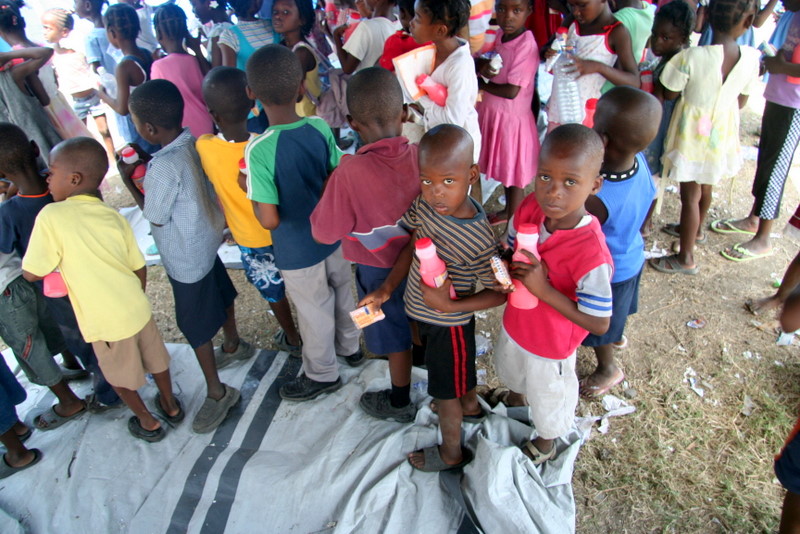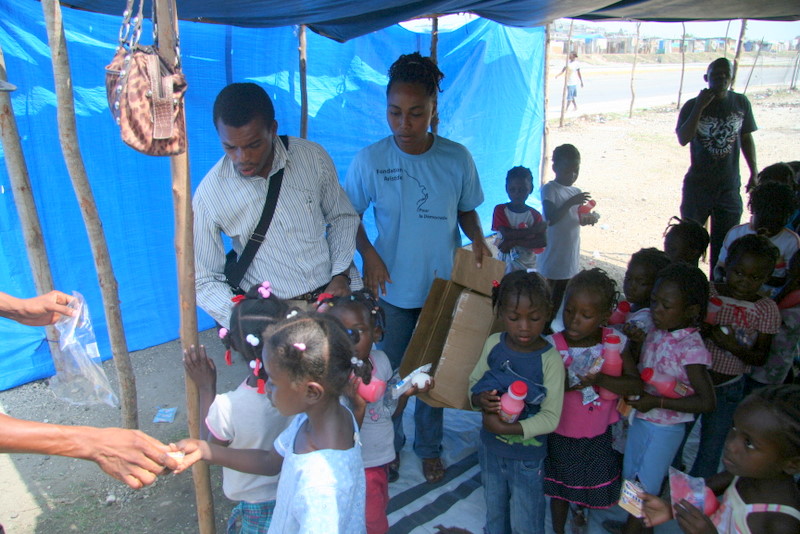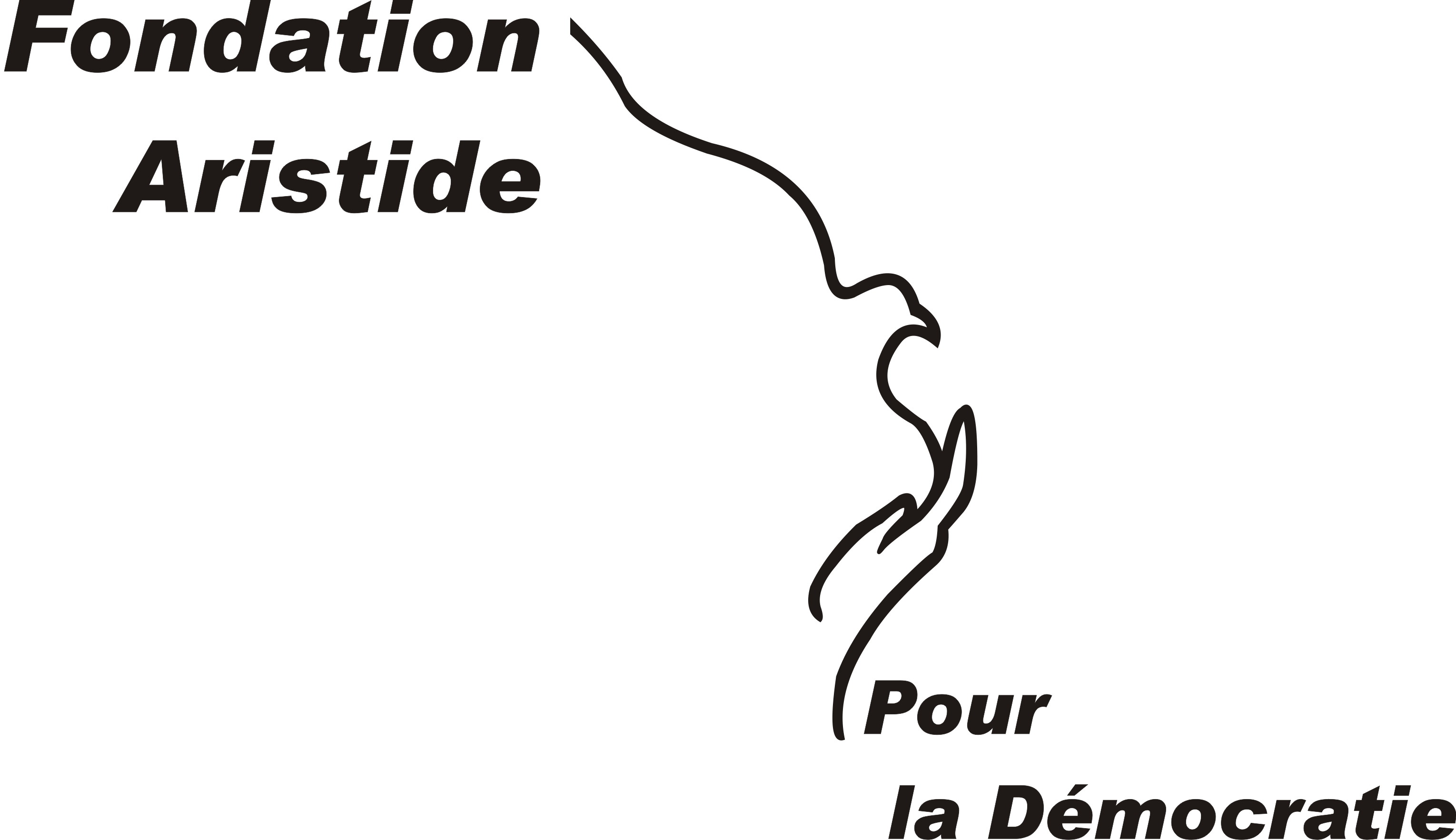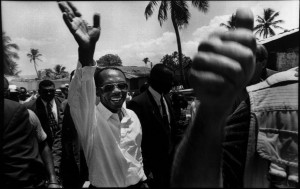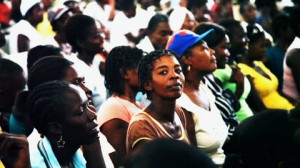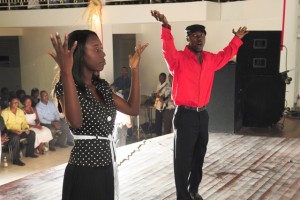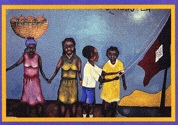Mobile Schools in the Earthquake Zone
We launched our Mobile School project in late February to do two things: support children living in refugee camps across Port-au-Prince and to offer immediate employment to young Haitians to work with kids at a time when the whole economy has collapsed. With the generous support from the Haiti Emergency Relief Fund we were able to get schools up and running very quickly. Since late February we’ve been running Mobile Schools, three hours a day, five days a week, serving 1260 kids in 5 refugee camps in the earthquake zone.
This project has surpassed our expectations at every level.
First the amazing compassion, vitality and professionalism of the 102 monitors we called on to staff the project has inspired us. The monitors are mostly young people who were students at the language and computer school of the Aristide Foundation at the time of the quake. Many of them have lost their houses and are facing terrible difficulties in their own lives. The coordinator of the mobile schools at the Tarpage encampment in Tabarre, Mirlande Janvier, was buried under the rubble with her son for two days after the quake before being rescued by her neighbors. But she wanted to open these schools. All the monitors and staff come to work every day with incredible energy and love for the kids they are working with. In March they got a boost when Leah James, a social worker from the University of Michigan did a training with them on how to support kids suffering form PTSD. (See her story on the Huffington Post here. )
Second the overwhelming response of the families in the camps has humbled us. At each site when we opened there was a massive press of parents desperate to get their children into the schools. We knew we were offering a very modest program – under tents in the open air, without books or professional teachers. The parents saw this as something far more profound –a chance, a future, some hope for their children. Here are a couple of testimonies from parents:
Esau, 31, Nazon: I thank God every day that my children can continue their education here at the school. You spend your whole life working to build a home to make life better for your children and then in a moment the catastrophe takes all that work away from you. We moved from our house because there were a lot of cracks in the walls. The concrete split open and was hanging from the ceiling. It was not safe anymore. First we stayed [in a camp] near the airport but it was very crowded so a month ago we moved here (to Nazon). When the director accepted my children to attend this school I was so very very happy because I want them to continue learning and getting an education. It’s good for them to go to school to have a normal life like children should have. It helps them be more confident.
Marjory 28, Tabarre: At the school my daughter learns to count, to say the alphabet and also she learns hygiene. When I come to walk her back after class she sings to me the songs they sing in the school. Her favorite song is “Head, Shoulders, Knees and Toes” Now she knows all the parts of her body and the days of the week, and months of the year. She is very clever and is learning everything very quickly. The teachers at the school are caring and love each of the children. They know what are the strengths of each child and they try to help each child. Going to school helps children forget about the earthquake for a short time. It’s good that the school is outside because the children will not go indoors. When there are aftershocks, the teachers calm the children.
We planned to take no more than 800 kids – we ended up with 1260. We had to draw the line there because we simply don’t have the money to do more, but school coordinators in each camp continue to report getting pleas from parents everyday to take their kids into the schools.
And then of course the kids themselves are amazing. They arrived from the first day in clean clothes, every child with shoes on. How is that possible when we know the kind of misery these families are living in? Well Haitians have always sent send their children to school with pride and dignity – even an earthquake, even the misery of the camps, cannot shake that. Watching the kids sing, dance, play, laugh, smile has been healing for everyone involved–kids, monitors, coordinators, parents. It’s a cliche perhaps to say that children are resilient and yet, they are, and they are the future of the nation.
When we opened the schools we thought, we hoped, we prayed that food distribution to families at refugee settlements would become more dependable. This has not happened. In none of the five camps where we are working is food distribution regular or sufficient to meet the needs of those living there. Two of the settlements – at Nazon and at Fontamara report that the Aristide Foundation was and is the first and only aid agency of any kind to come to where they are. These two camps are not on main roads (though they are smack in the middle of Port-au-Prince), but even at Carradeux on the campus of UniFA (the Medical school of the Aristide Foundation), at Tapage in Tabarre, and at Building 2004 , a stone’s throw from the airport, there is nothing resembling regular food distribution.
The terrible reality is that the snack we provide in the mobile schools is for many kids the only meal they get that day. Naturally children line up more than once, or stash away snacks for their parents. And yet, somehow the AFD monitors and coordinators along with the families in the camps have established enough discipline to run this project – including a daily snack distribution for the children right in the midst of camps of starving people. There have been no major disruptions –a profound measure of how committed these communities are to making these schools work for their kids.
________________
Mobile School Update July 2010
An estimated 90% of the schools in Port-au-Prince were damaged or destroyed in the earthquake. Tens of thousands of children are living in refugee camps and will be for many months to come.
The government of Haiti officially reopened school in early April–meaning they announced that schools were reopened. But with so many schools destroyed and with the responsibility for reopening schools primarily left in the hands of individual school directors, some of whom received gifts of tents and supplies, many of whom did not, schools opened slowly if at all. By late April about half the kids in the Mobile School project had returned to school. We were very happy for those children. And very worried about the rest of the kids for whom school remained a distant possibility (for all kinds of reasons–their school was destroyed and there is no sign of it being reopened, they lost their uniforms in the quake and their parents had no money to buy new ones, their parents can no longer pay school fees, they are displaced from where they once lived and cannot afford to travel back to their old schools, or, for a minority, they were never in school before the quake.)
We never intended to run full-time schools– this was always to be a temporary project to respond to the immediate emergency of the earthquake. But the parents in the camps begged us not to leave.
We’ve decided to continue the program as a recreational/arts/sports program 2-days a week, with a schedule, which will not conflict with school for those who have returned to school. After a Summer holiday in June and July we plan to tranisition the project to a Friday afternoon and Saturday morning program. The AFD will still be able to be present in the camps, accompanying children, and building on the relationships already established with their parents. We will also be able to keep providing a work stipend to a group of young teachers. In addition, to the recreational activities the kids have already been doing (arts and crafts, singing, dance, theater) we will increase the emphasis on mental health and add an agricultural component.
We plan to increase an emphasis on mental health work by more closely linking this project with the Soulaje Lespri Moun (Relief for the Spirit, our Lay Mental Health Worker Project aimed at parents). Through the Soulaje Lespri Moun project professional mental health workers from the US have been providing training to our staff to enable them to lead workshops with earthquake survivors in the camps. A group of 37 Haitian-American Psychologists and Social Workers will be coming to Haiti and staying at the AFD for a week in August. The Mobile Schools monitors will all receive training from these professionals on working with children after a trauma. Together the Mobile School project and the Soulaje Lespri Moun Project will offer workshops and training on dealing with trauma and symptoms of PTSD for both children and their parents in the camps.
Finally, we will add an agricultural education program for the children in the Mobile Schools. Near the Foundation in Tabarre we have an ongoing agricultural project with a group pf 150 peasant farmers, who are growing corn, beans and vegetables and planning to build fish ponds. In the wake of the quake, the importance of supporting local food production, and of maintaining food producing land near the urban center has become even more urgent. We want to connect city kids living in refugee encampments to food production. On Saturdays groups of children from the Mobile Schools will work on two integrated farms plots (groups from each of the camps will work in rotation). The mobile school monitors will accompany them as will the farmers who are cultivating the plots. The kids will participate in creation of the plots, learn skills associated with organic, integrated farming, including irrigation processes and fish farming When the crops come in and when the fish produce each child will get a share to bring back to their families.



